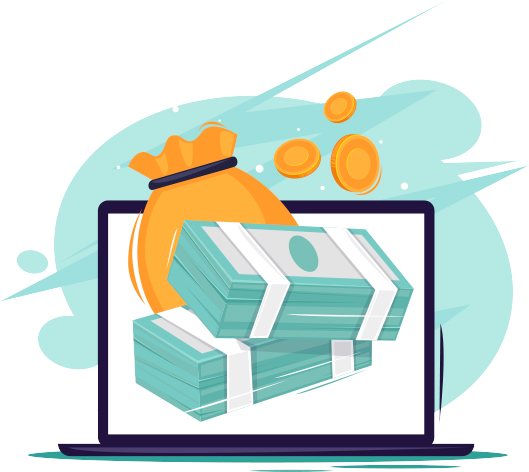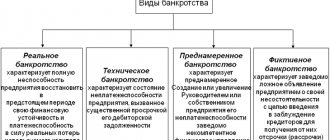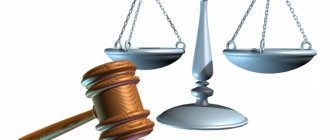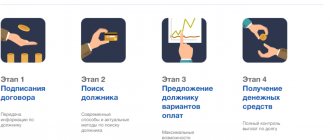The more difficult the economic situation in the country, the more citizens wonder how to get rid of debts. Often scammers rush to their “help”, promising to clear or completely delete their credit history and write off debts. However, it is impossible to legally get rid of debt in this way, however, it is also illegal - it doesn’t work, and no one can really write off your debts or clear your CI. We tell you how to legally get rid of debt obligations without getting into trouble in this article.
Goodbye loans, or how does the statute of limitations work?
In Russia, there is a statute of limitations on loans. It lasts 3 years. By law, after this period, your creditors cannot go to court to collect overdue debt from you. It would seem that there is nothing complicated - wait 3 years and say goodbye to the loan, but no. There are a number of nuances and important conditions, namely:
- The creditor's claim cannot be accepted.
- It is not possible to reconcile mutual settlements. On its basis, an act is drawn up, the presence of which is regarded as your recognition of the debt.
- Finally, if you have already chosen this path, there is no need to ask for a deferred payment or initiate other changes to the terms of your contract.
However, it is important to understand that after 3 years your credit history will not become clean, rather the opposite. The bank has the right to write in your credit history everything that it considers necessary to indicate regarding your loan. Of course, no one will lend to you after such a story - such black spots from CI can no longer be erased.
By the way, these 3 years will definitely not be the easiest and it is not a fact that you will be able to withstand this period. All banks have their own systems for working with debtors, and few really let the situation take its course, limiting itself to calls or letters. Most often, collectors, lawyers, etc. are involved, especially if we are talking about a large loan. They will look for you, they will call your relatives and friends. The employer will not be left without attention. And if you have property, it is possible that they will simply sue you.
What it is
It’s worth first looking at what microloan debt is and whether it’s possible to get rid of it completely. The debt structure usually looks like this:
- the amount taken from a microfinance organization;
- loan interest rate;
- fines and penalties that have already accumulated for the debt.
It will be impossible to get rid of the microloan amount. In any case, this money will have to be returned, because the borrower received it and has already used it. You will have to repay the loan even if the loan agreement is declared invalid.
But you can easily fight to reduce the penalty and interest, and this can be done both in court and pre-trial. A microloan agreement is possible.
Typically, getting rid of a loan is aimed at tasks such as:
- make the debt as small as possible;
- achieve for yourself conditions under which it will be possible to pay off the debt calmly and conveniently.
Important aspects
You need to start thinking about how to legally get rid of a microloan immediately after realizing that you can’t pay off the debt, because it will only increase.
By the time you understand this, most likely, a very large penalty will not accrue, which means that there is still a huge chance to get out of the situation without large financial losses.
And even when the situation has become too serious, you still shouldn’t panic and give up.
There are several legal points in which you can reduce the loan, or ensure that there are acceptable terms for repaying the debt.
How to reduce interest on debt
It is possible to reduce interest on debt with the help of the court, but you should take into account important nuances and deal with a whole list of issues that relate to the calculation of this interest.
If everything is not well thought out in advance, then the situation can even worsen.
| Main debt | This is the amount that the client took from a financial institution, taking into account the interest rate that is agreed upon in the agreement |
| Penya | This is interest on late payment |
| Total debt | This will be a combination of all debts that the borrower has to a bank or microfinance organization |
Of course, the first step is to pay off the principal debt; moreover, it cannot be divided into a loan and interest separately.
The procedure for calculating interest is regulated by Article 809 of the Civil Code of the Russian Federation. If the principal debt is paid. Then interest will no longer accrue.
After paying the principal amount, it is worth dealing with penalties. You can cover it, or ask the court to reduce the amount of the penalty. The borrower's rights to such actions are specified in Article 333 of the Civil Code of Russia.
It is, of course, recommended to resolve the issue of reducing interest with the help of specialized lawyers. These people can fully study the case and determine whether it is necessary to go to court and, of course, suggest how best to proceed.
Consultation with a lawyer is absolutely free. Consultation takes place at a law firm or online.
Legal basis
In Russia, since July 1, 2014, Federal Law No. 353 “On Consumer Credit or Loan” has been in force, based on which we can say for sure that the contract when concluding a transaction must indicate the full amount of the loan and its full cost.
The full cost is determined by the Central Bank of Russia.
In accordance with the same law, at the time of conclusion of the transaction, the total cost of the credit or loan cannot be higher than the average market total cost of a consumer loan calculated by the Central Bank.
If you look at the Civil Code of the Russian Federation, or more precisely at its 333 article 23 chapter, then the court has the right to reduce the penalty if it is clearly disproportionate to the consequences of violation of direct obligations.
Based on Article 404 of the Civil Code of Russia, the reduction of the penalty does not in any way affect the rights of the borrower and the right of the lender to compensation for material losses, which are provided for in Article 333 of the Civil Code of the Russian Federation.
All rise, the court is in session
The creditor lends you funds in accordance with the agreement, and therefore, in the event of a long delay or non-repayment, he can absolutely legally go to court. Most often, banks win such cases, and therefore the court imposes obligations on the debtor to repay the debt, and if you do not do this voluntarily, the bailiffs come into play. This is difficult to avoid due to the fact that the debtor approaches this stage, as a rule, without a penny to his name, and the sale of property, if available, takes time. What do bailiffs do?
This situation usually has two development paths:
- Seizure of accounts. This is the first thing the bailiffs do, since withdrawing money from the account is easier and cheaper than selling your property. By the way, not only money can be withdrawn from your card, but also your deposits.
- Working with property. If no accounts are found or there are no funds for them, the bailiffs have to seize the property for resale and repayment of the debt to the bank. As a rule, the car and valuables are the first to be hit.
Also, the borrower will probably be banned from traveling abroad. In such a situation, you need to get rid of debts with minimal losses. You should contact the bailiffs in person, provide papers on transfers that are not subject to withdrawal from your accounts, discuss your situation - in some cases it is possible to set a fixed amount that will be debited from your account. This is not a quick process and all your “exploits” will remain in the memory of your CI, but this way you can really get rid of debts legally.
You can get more detailed information on this topic in our article “Account Seized. What to do?".
Illusions or reality?
Now the online loan system is so well developed that to borrow several thousand rubles in a few minutes, you don’t need anything at all except what every adult resident of the Russian Federation has:
- passport;
- mobile phone for communication;
- card of any bank for transferring loan funds.
You don’t even have to leave your apartment, just use your computer or smartphone, go to the credit company’s website, apply for a loan and withdraw money from your card within an hour. It's really very convenient and can literally save you in an emergency.

You should understand the main thing: when you need money really urgently and urgently, when you cannot do without operational additional investments, this is a worthy reason to use a loan. Other situations that do not meet these parameters are not a suitable reason to increase your debts, which you so want to get rid of.
If you take out loans for everything without thinking about how you will pay the money back, you will probably feel free for a short time, with some power. This feeling is very pleasant. But, unfortunately, it is illusory.
Use instant online loans from official microfinance organizations when this is a truly serious issue that requires an immediate solution. If you want to stop living in debt in real life, then you need to look at the situation in which you find yourself now only from a realistic position.
Don't make things difficult for yourself and don't mislead yourself. Even if the real path to freedom looks much more difficult than you would like, the results of your efforts will not go away, unlike the past imaginary “victories” with the help of borrowed money.
To do this you need:
- Submit an application to the Arbitration Court at your place of residence. Fill out an application in free form, the main thing is that it contains comprehensive information on your problem, namely:
- your personal data;
- name of the bank/banks to which you owe;
- reason for delays;
- period of delay;
- the amount of your total debt.
- Document that you are insolvent and have debts, and not only on loans.
- Wait for the court's decision on your case. If the applicant does not have funds in his accounts, a permanent source of income, or property, he will be declared bankrupt.
It seems simple, but in reality the procedure takes about six months. In addition, for all this you need to pay up to 40 thousand rubles. Of course, no one will give you a loan after this, but if you really have nothing with which you could pay off your debts, it is wiser to go through this procedure and legally relieve yourself of all obligations than to hide from collectors for years.
The fate of the bill on extrajudicial bankruptcy will also soon be decided. If the law is adopted, citizens with debts in the amount of 200 to 500 thousand rubles. They will be able to go through the procedure completely free of charge, and the application can be submitted simply through the nearest MFC.
Will bankruptcy help in writing off debts?
A bankruptcy lawyer will tell you how to get rid of microloans legally. If the debtor has accumulated several overdue loans, then it is necessary to calculate the total amount of debt with interest without taking into account penalties and fines. At the moment, the bankruptcy procedure for individuals is possible with debts of 500,000 rubles.
Don't expect debt relief to happen quickly, painlessly, and effortlessly. The procedure can last from six months to 3 years. You need to go through several steps:
- debt restructuring;
- inventory and sale of property;
- debt repayment, and if the proceeds are not enough, debt write-off.
Before filing for bankruptcy, we recommend that you consult with an attorney. He will check to see if you committed any actions the day before that the court may consider grounds for refusing to write off. Will help you select a candidate for a financial manager and collect the necessary documents.
Would you like to write off all your debts?
A free consultation with our specialists will allow you to compare risks and take the first steps towards bankruptcy.
Send a request
Restructuring
This is the softest and least painful option for resolving the debt situation. However, it is available for a certain time. If you ignore the banks when they try to contact you to work with your debt, this opportunity may be lost because sooner or later the bank will sue you or sell your debt to debt collectors.
Most often, banks offer debt restructuring as follows:
- Extend the payment period. The amount of debt and the rate will remain the same, but the loan term is extended, due to which the amount of the monthly payment is significantly reduced. This is a good option for those who are willing to pay and want to pay off their debts, but do not have enough funds to pay the payment specified in the agreement.
- Credit holidays + review of contract terms. This is suitable for those who are experiencing temporary difficulties and need a little “break”. The bank can provide this opportunity and revise the terms - increase the loan term for those few months that you have not paid, or increase the size of the monthly payment after the holidays by evenly distributing the amount of payments for this period over the remaining loan term.
In exceptional cases, banks can make concessions and write off penalties and fines if there was a delay, but this is only possible if the reason for the delay was really serious, for example, illness.
Refinancing
An ideal option for those who have not yet reached their arrears, but are facing financial difficulties and understand that the very next payment or loan payment in a month can become a big problem. In such a situation, you need to urgently look for refinancing or refinancing, without waiting until you cannot pay, and your clean CI will be replenished with overdue notes.
Refinancing involves finding banks that lend to citizens on more favorable terms, and actually getting a new loan to pay off the old one. It is important to carefully study the rates and other nuances, because they should be lower than current ones. That is, for example, online microloans or a microloan to an account will not suit you for such purposes. There must be a refinancing program from a reliable bank. No one will give you the money in your hands - it will be transferred to pay off the old loan agreement. And you will have the opportunity to pay less and reduce the burden on your budget.
Restructuring and refinancing are, of course, the best ways to get rid of debt. After this, you will have every chance of getting loans in the future and maintaining your reputation as a borrower. In all other cases, in critical situations you will have to rely only on yourself.
Why bankruptcy may not free you from debts
The fact is that a court can declare a citizen bankrupt without attempting to restructure debts on the basis of a petition from the citizen himself and in the absence of a source of income for the citizen. The heavily loaded capital courts, in my opinion, did not want to waste time assessing how futile debt restructuring was. And the legal positions developed by regional courts, where borrowers without a source of income are much more common, have successfully taken root in the capital.
In the case of 55-year-old loader Ovsyannikov, the procedure for selling property was completed very quickly, but the court refused to release the debtor from debts. The court found that the debtor assumed obviously unfulfillable obligations and concluded that he acted in bad faith to the detriment of creditors. To draw an unambiguous conclusion about the reason for such a decision, you need to see the case materials, and I did not have such an opportunity.
Read on RBC Pro
Michael Dell: “I’ll worry about the company’s affairs even after I die” Dream job: which employees are really happy working remotely Anti-crisis marketing: how to work through a crisis to your advantage Lean management tools: vision boards and stand-up meetings
On April 7, another similar ruling appeared - from the Arbitration Court of the Tyumen Region in relation to Alexander Volkov. He applied to the court to declare him bankrupt due to overdue accounts payable in the amount of 5.5 million rubles for more than three months. The application was considered justified, and a restructuring procedure was introduced against the debtor for a period of four months.
However, the creditors were unable to agree on and submit a restructuring plan to the court for approval, on the basis of which the financial manager filed a petition to introduce bankruptcy proceedings against Volkov and sell his property. During the consideration of this petition, it was established that Volkov did not have any property that could be included in the bankruptcy estate, and it was impossible to satisfy at least partially the claims of the creditors. In addition, the court decided that the debtor did not have the ability to pay court costs, and on this basis terminated the proceedings - according to bankruptcy law, the court has the right to do this.
The court considered that release from debts is possible only after completion of settlements with creditors. Since no settlements could be made due to the lack of any property, the court simply dismissed the case, leaving the citizen with debts. The definition directly states: “The legislator has provided for settlements, that is, ensuring the conscientious cooperation of the debtor with creditors and the financial manager, as a mandatory condition for exemption from the fulfillment of obligations.”
Perhaps the court came to such disappointing conclusions for the debtors because both Volkov and Ovsyannikov are similar to serial borrowers: Ovsyannikov took out four loans from three banks, and Volkov had even more loans - seven loans from six banks. This could significantly influence the judges' decisions.
Another essentially similar refusal to file a citizen’s bankruptcy was issued by the Arbitration Court of the Sverdlovsk Region in relation to Sergei Vorontsov, also deciding that the purpose of bankruptcy is not to free the citizen from debts, but only to satisfy the claims of creditors. In this case, the court also justified its decision to terminate the proceedings by the fact that the debtor does not have property, through the sale of which it would be possible to satisfy the claims of creditors and compensate for legal costs.
Vorontsov appealed the court's ruling not only in the appellate instance (which upheld the decision of the Sverdlovsk court), but also in the Arbitration Court of the Ural District. The cassation court overturned the decisions of the court of first and appellate instances and returned the case for a new trial.
Of course, it is too early to draw global conclusions, but the emerging tendency in the courts of first instance to make decisions according to the principle “no property - no bankruptcy” is very alarming. On the one hand, without money for legal expenses there cannot be a trial, but in our country the amount required for this is minimal.
But, on the other hand, insufficient funds to pay creditors should not be an obstacle to bankruptcy. On the contrary, for the debtor the goal of getting rid of debts is not only significant, but also legal. People often receive loans not because their existing income allows them to repay them, but based on realistic expectations of an increase in income. And when a bank issues a loan, it checks the borrower’s creditworthiness, that is, simply put, it decides whether he can repay the debt or not. If it is not proven that the debtor falsified documents about his property status or income that he submitted to the bank, there are no grounds to refuse him relief from debts.
I hope that these isolated cases will not become a general rule, discrediting the idea of bankruptcy as an opportunity to start economic life over again.








